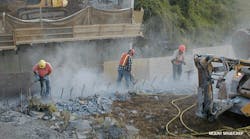OSHA Delays Enforcement of Crystalline Silica Standard in the Construction Industry
OSHA on April 6 announced a three-month delay in enforcement of the crystalline silica standard for construction, citing the need for more outreach, educational materials and guidance for employers.
The agency has determined that additional guidance is necessary due to the unique nature of the requirements in the construction standard. Originally scheduled to begin June 23, enforcement now will begin Sept. 23.
OSHA expects employers in the construction industry to continue to take steps either to come into compliance with the new permissible exposure limit, or to implement specific dust controls for certain operations as provided in Table 1 of the standard. Construction employers also should continue to prepare to implement the standard’s other requirements, including exposure assessment, medical surveillance and employee training.
Reviews were mixed on the announcement of the delay.
The Construction Industry Safety Coalition in a statement said it “is pleased that OSHA has recognized the need to develop guidance material for the construction industry before enforcing the silica rule, and we remain committed to working with the agency to create a feasible standard that promotes safe and healthy jobsites. While the CISC appreciates the 90-day delay in enforcement, the CISC remains concerned about the overall feasibility of the standard in construction and has requested that the agency delay enforcement for a year.”
The AFL-CIO claims the delay has “deadly consequences” for workers, with AFL-CIO President Richard Trumka commenting, “The labor movement has fought for decades to win this lifesaving rule, and any further delay is unacceptable. The longer the Trump administration delays, the more workers will suffer and die. This action alone will lead to an additional 160 worker deaths. We will do everything possible to make sure this commonsense rule is not taken away. Workers’ lives are at stake.”
Jessica Martinez, co-executive director of the National Council for Occupational Safety and Health (National COSH), noted that the standard is backed by “solid scientific evidence and the experience of workers who have suffered cancer, silicosis and other life-threatening diseases. There is no reason for delaying this rule, which will save more 600 lives each year.”
With construction season underway, “three months of delay means that millions of workers will be exposed to hazardous silica dust that will make them sick and take their lives,” said Marcy Goldstein-Gelb, co-executive director of National COSH. “Tools to wet down silica dust and vacuum it up are practical, affordable and readily available. The new standard was announced more than a year ago and employers are aware of their responsibilities to limit worker exposure. To protect workers, the time to act is now.”

